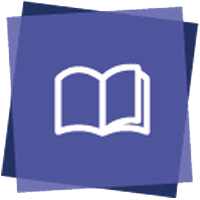
A great place to start your research is to read an encyclopedia entry about your topic. An encyclopedia entry will typically be fairly short, but full of information. It may include a historical summary, quick facts, and key dates. This can also be a great way to brainstorm more keywords.

Provides articles, images, charts, maps and other materials on thousands of topics. Provides full-text online access to hundreds of multidisciplinary reference book collections, including art, history, law, medicine, psychology, technology, bilingual dictionaries and encyclopedias.
Searching for your topic in a video database is a good way to discover documentaries and video clips related to your topic. The videos provided in a library database are typically created by scholarly filmmakers and documentarians.
An eBook can be similar to an encyclopedia or reference work, but will typically go more in depth on a selected topic and provide more details and insights. One nice feature of an eBook is that it is easy to search and find the chapters that will specifically relate to your topic and keywords.

A collection of more than 135,000 full-text ebooks covering a wide range of subjects, including business and economics, computers, technology and engineering, humanities, life and physical science, and social and behavioral sciences.
Most research databases provide information from academic journals, magazines, newspapers, books, and videos. Most databases will allow you to choose what types of results you want to see. For example, if you are not interested in peer-reviewed articles from scholarly journals then you can filter those out. You also have the option of searching either a general research database or one that is connected to specific subject. See examples below.
These databases typically have a lot of information on a wide variety of topics.

Offers information in nearly every area of academic study, including arts, biology, chemistry, computer sciences, ethnic studies, engineering, language and linguistics, literature, medical sciences, philosophy, physics, psychology, religion, social sciences, and more. The collection contains peer-reviewed scholarly journals, magazines, several major newspapers, and a limited number of books, conference proceedings, and government publications. The full text of many titles is available, but for some titles, the database includes indexing and abstracts only.

ProQuest is a collection of many databases that provide access to thousands of journals, magazines, newspapers, dissertations, and other publications.
This link " Databases by Subject " will take you to a list of library databases that are grouped by subject. This can be helpful when you are wanting to look at a more specific set of resources. For this assignment, it would probably be helpful to look at a history database since you are wanting to explore the background and history of a tool or invention.

Covering topics in U.S. and world history from the earliest civilizations through the 21st century, History Reference Center is a research database containing full-text journals, magazines, reference books and thousands of primary source documents.